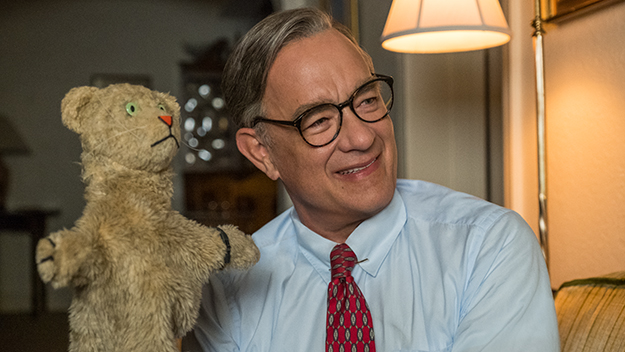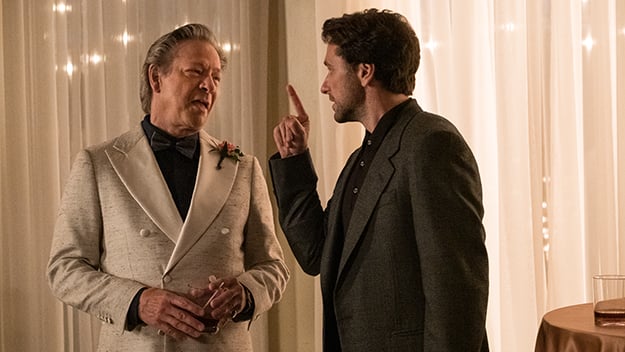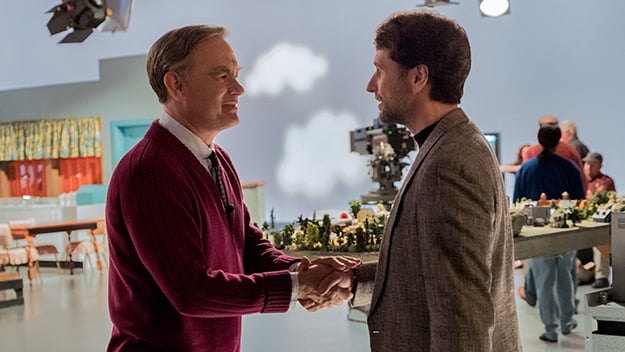Deep Focus: A Beautiful Day in the Neighborhood

All images from A Beautiful Day in the Neighborhood (Marielle Heller, 2019)
Director Marielle Heller told the Los Angeles Times that when she pitched Tom Hanks to play children’s TV pioneer Fred Rogers, “I described how I saw the movie—that I didn’t want it to be a biopic…. It was really a character piece about manhood and what it is to be a good person.” The problem with the movie is that it’s neither. It treats the collision of cynical New York-based slick-magazine writer Lloyd Vogel (Matthew Rhys) and idealistic Rogers (Tom Hanks) as a conversion experience. Assigned to profile Rogers for a “heroes” issue of Esquire in 1998, Vogel shows up on the Mister Rogers’ Neighborhood set in Pittsburgh with his own parricidal version of the Mark of Cain: a scabbed nose, the result of a fistfight with his father, Jerry (Chris Cooper). Rogers doesn’t need a physical sign to sense a soul in pain. His wife says he isn’t a saint: she testifies that he has a temper. But so does the Old Testament’s God. In this movie, Rogers combines the instant understanding of a sci-fi empath with a divine sort of doggedness. He’s a walking love-bomb with a very long fuse.
It’s obvious from the outset that Vogel’s jadedness will melt when exposed to Rogers’s faith in kindness, forgiveness, and the uniqueness of every human being. In one of the film’s twee stabs at stylization, the screenwriting team of Micah Fitzerman-Blue and Noah Harpster frame Vogel’s tale as an episode in Rogers’s series. Rogers describes the writer as a friend—and we know Rogers would never leave a friend in need. Bridged by views of New York, Pittsburgh, and suburban New Jersey rendered in miniature models akin to the Neighborhood’s, a series of more or less realistic scenes depict Vogel as a glib careerist, haphazard dad and husband, and stubborn, belligerent son who refuses to make peace with the father who abandoned his kids and ailing wife years ago for his mistress, Dorothy (Wendy Makenna).
The point and counterpoint between Vogel’s unexamined life and Rogers’s thoroughly examined one ratchets up into bland hyperbole. Vogel walks obliviously through a mom-and-baby klatch organized by his smart, appealing wife Andrea (Susan Kelechi Watson) for herself and their adorable infant son. He ignores his father, who parks in a Cadillac under his window and waits for some filial recognition, while Rogers, his soon-to-be spiritual father, tells him on the phone that nothing is more important to him this moment than talking with Vogel. Long before Vogel boards a bus for a second trip to Pittsburgh after provoking Jerry into a heart attack and leaving Andrea and son at a New York City hospital with him and Dorothy, we feel like screaming “Uncle!”—though that would probably summon another relative Vogel has neglected or abused.

The movie enables us to glimpse something great or near-great: Hanks’s profoundly instinctive portrait of a preternaturally tolerant and rational man. But this trumped-up story keeps getting in the way. The script riffs off Tom Junod’s 1998 Esquire cover story, “Can You Say…Hero?” Yet as Junod relates in a new Atlantic story, “What Would Mr. Rogers Do?,” Fitzerman-Blue told him, “Well, basically everything in the script that’s about the relationship between you and Mr. Rogers is very accurate…. But everything else –the relationship between you and your father and you and your wife—is made up.” Junod still views the film as “a culmination of the gifts that Fred Rogers gave me and all of us, gifts that fit the definition of grace because they feel, at least in my case, undeserved.” He also hails Heller for being “so faithful to the essence of the story. A long time ago, a man had seen something in me that I hadn’t seen in myself.”
Junod’s disclosures about his real vs. reel self betray the gap between authentic drama and movie cliché: “I hadn’t become a hard-bitten investigative journalist consumed by anger, but rather an ebullient charmer concerned by my capacity for silken cruelties committed in the name of revelation.” Likewise, his dad was not “a boozy philandering lounge act so down at his heels that he sleeps in his Cadillac,” but “a fetishist of his own fragrant masculinity…. I had never rejected him or his message, which was that nothing is more important about a man than the way he looks, the way he carries himself, and the mystery of what my father called his ‘allure.’” Rhys, so masterly at furtive emotion in The Americans, can’t supply suggestions of depth to a character who’s more a straight-faced parody of a city slicker than an urban Everyman.
Hanks, however, transcends this film’s post-modern soap opera. A few years ago, in Saving Mr. Banks, Hanks revealed the savvy and shrewdness behind another beloved deity of children’s entertainment, Walt Disney. Fred Rogers is Disney’s opposite number in many ways, but Hanks imbues him with a gentle implacability, a quiet energy, and a perfectionist focus that rivals any mogul’s showmanship and drive. He summons an aura of empathetic concentration. He expresses both Rogers’s genuine fellow feeling and his belief that a person must work at it, all the time. He scales up Rogers’s presence slightly, perhaps to persuade us that he does occasionally experience so much anger and frustration that he must vent it by swimming extra-hard or banging the low keys on a piano. In a movie that’s resolutely incurious about the roots of Rogers’s wisdom, Hanks at least preserves a pocket of intrigue that draws us in. He’s superb at conveying the distance between Rogers’s soothing presence as a host and spiritual guide and his naked vulnerability as his hand-puppet alter ego, Daniel Striped Tiger.

In a scene that, like so many others, draws on key aspects of the Rogers legend, Rogers asks Vogel, over a Chinese lunch, to consider silently, for a full minute, the people who “loved you into being.” As Rhys registers Vogel’s unbanked emotions, Hanks refuses to fall back on heartwarming reflexes—in closeup his eyes are startlingly ambiguous. But Heller’s direction falls apart. For the most part, Heller artfully echoes Rogers’s instincts in the unusual stillness and patience of Hanks’s intimate scenes. Here, though, an entire restaurant grows silent, as if in a burlesque of the vintage ad, “When E.F. Hutton talks, everybody listens.”
Heller, a stage actor herself, made a phenomenal debut with The Diary of a Teenage Girl (2015), which she wrote and directed herself from Phoebe Gloeckner’s graphic novel. The skill she displayed at conjuring volatile mixed feelings there are absent from her entertaining but shallow Can You Ever Forgive Me? (2018), because the script by Nicole Holefcener and Jeff Whitty turned the maliciously witty memoirs of biographer-forger Lee Israel into a humor-tinged fable about authenticity. As in that film, Heller dots A Beautiful Day in the Neighborhood with splendid supporting performances. Cooper pulls off some daring provocations early on as Jerry Vogel, before he starts pleading for his son’s sympathy, and Enrico Colantoni and stage and TV actress Maryann Plunkett provide brisk, rooted turns as Rogers’s producing partner Bill Isler and Mrs. Joanne Rogers.
Heller varies the visual texture. She and cinematographer Jody Lee Lipes use the same model camera that shot the TV series—the Ikegami HK-323—to shoot their version of Mister Rogers’ Neighborhood. It carries us into a more intimate and tender space. In an early high point, Vogel observes Rogers struggle and fail to open a tent in front of his TV camera. Instead of doing a retake, Rogers leaves the bit in as a comic vignette: it demonstrates to kids that even adult plans can go awry. (David Letterman showed that clip during Rogers’s 1982 appearance on his late-night show.) Too bad there’s little room for spontaneity or happy accidents in this overly gimmicky film.
What the last two Heller movies call into question is her script judgment. She deserves credit for helping Hanks go as far as he does with his performance—and blame for a bogus storyline whose pro forma redemptions constrain it.
Michael Sragow is a contributing editor to Film Comment and writes its Deep Focus column. He is a member of the National Society of Film Critics and the Los Angeles Film Critics Association.







